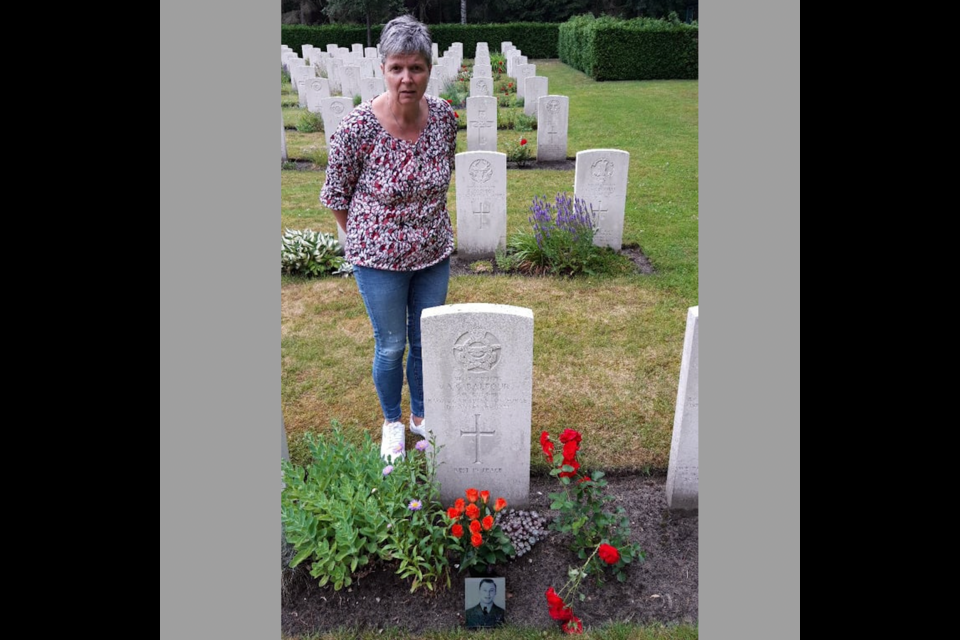Like her grandmother and aunt before her, Rean Snijders-van Meijel faithfully visits the Venray War Cemetery in her small Dutch city, caring for the grave of Guelph's Andrew George Balfour, a member of the Royal Canadian Air Force who was killed in action while helping liberate the town from Nazi occupation in 1944.
It is a time-honoured tradition in the Netherlands that sees the responsibility passed on through generations of the same family. Dutch citizens who adopt graves visit regularly, bring the deceased flowers on their birthday and spend time with them on Remembrance Day or on Christmas Day. If the deceased was a father, they will visit the grave on Father’s Day.
Now Snijders-van Meijel is reaching out to Guelph in an attempt to connect with any of Balfour's relatives.
“What we want to tell our children is what happened during that time and that that young man there died for our freedom,” said Theo Vervoort, speaking from the Netherlands on behalf of Snijders-van Meijel.
“Quite simply, we should never forget them. We should always remember them.”
The Dutch adopt the graves of those who helped liberate their country, caring for them as they would deceased members of their own family.
Snijders-van Meijel’s grandmother took care of Balfour’s grave for many years until she passed away in 1998. Her aunt took care of it till 2018 before it was adopted by Snijders-van Meijel in 2019.
"Her aunt visited Canada to look for who Andrew was, where he lived and if there were relatives. She was not successful," said Vervoort.
Snijders-van Meijel has a few details about Balfour such as his occupation, his age, the name of his mother, father and sister. What she doesn’t know is if Balfour had children or nieces and nephews. If she does find any descendants of Balfour, she hopes to connect with them so they can collectively pay their respects.
Born in Guelph on Sept 25 1920, Andrew George Balfour was a pilot officer in Royal Canadian Air Force. Balfour’s attestation paper from the Royal Canadian Air Force found in the Canadian Virtual War Memorial states that he was the son of Edna Porter Balfour and Father Andrew James Balfour.
“Was Edna married? Does she have children? Are they still alive? Do they want contact with Rean who adopted the grave because she wants contact,” said Vervoort.
A letter in the Canadian Virtual War Memorial written by his sister (also named Edna) to a government employee indicates that Balfour had more than one brother and sister. It also indicates that Balfour cut off ties with his family.
“Andrew was an airman. He suddenly crashed in our area in 1944,” said Vervoort.
“We want to give these people an identity and face so we are looking at where he is from, where is his family and do we have a photo of him.”
Karen Hunter, a Guelph resident and creator of The Canadian Remembrance Torch, a not-for-profit organization that honours Second World War veterans, said her team is currently trying to contact Balfour’s relatives.
She said Balfour had three sisters and two brothers, one named Gordon whose wife is alive and shares children with him.
Vervoort said there are nearly 700 young men buried in the cemetery. “This time, 650 graves are adopted by people in our environment,” he said.
“The Commonwealth War Graves Commission looks after the cemetery, but the people who adopted the grave are visiting the people who visited our town during the Second World War.”
Vervoort said many Dutch want to adopt graves and he doesn’t expect it to be long before all 700 graves are adopted.
He said he has been helping families in the Netherlands find relatives of soldiers for some time now. He himself adopted three graves of UK soldiers that his daughter will care off after he passes away. He says he is in contact with descendants of all three soldiers, some he chats with every day.
“It’s a special relationship,” said Vervoort.
“When COVID is over, they are coming over and we are going to the cemetery to pay our respect to these men.
“We think we should always remember the people that died for us, for our freedom,” said Vervoort.
He said many people who adopt graves want to know more about the person buried because they are so grateful for the freedom they enjoy every day, something not every country in the world has the privilege of.
“That are lots of counties where you can’t say what you want and you can’t do what you want and we are happy that we can now do what we want,” said Vervoort adding that as a child, he remembers his father telling him stories about not having the basic freedom of speech during the war.
“We are very thankful for the people who gave their young lives for our freedom. That's the main reason. Of course, I work every week over the cemetery and I’m always very sad for so many young people who were very brave and gave their lives for our freedom. For people, they don't even know.”
